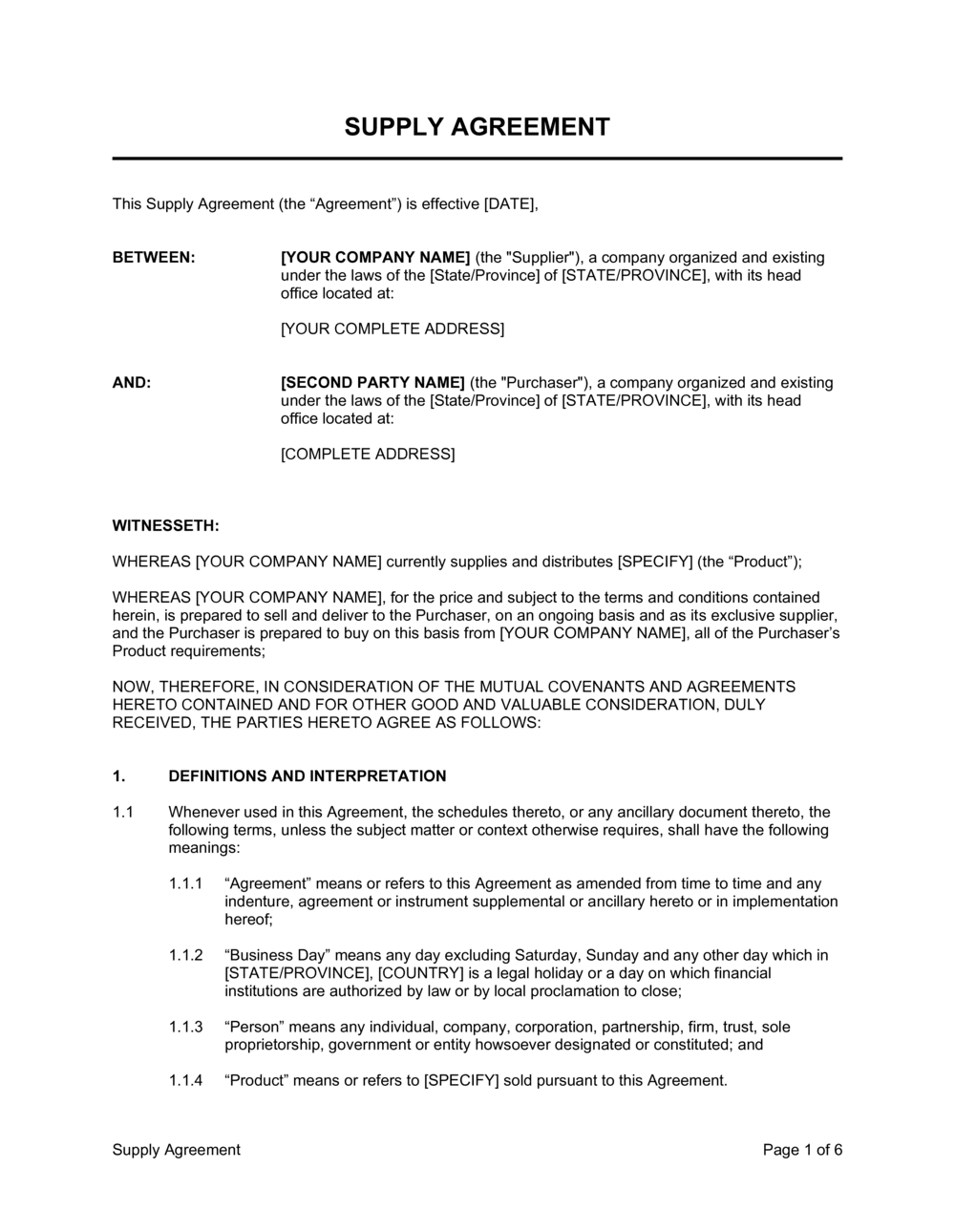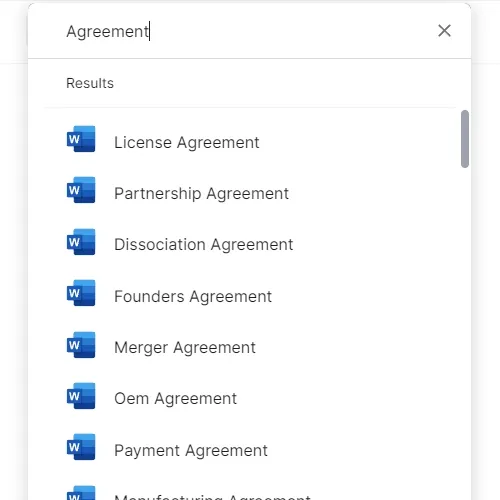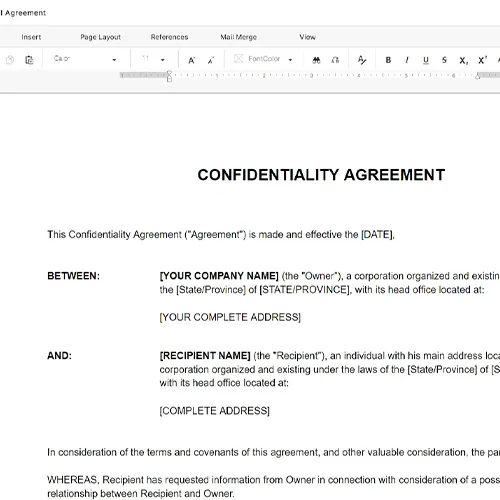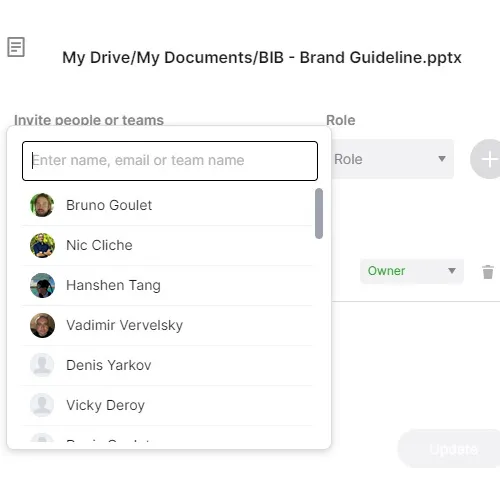Supply Agreement Template

Streamlining Business Operations with a Supply Agreement
In the complex world of business, maintaining a reliable and efficient supply chain is critical for operational success. A Supply Agreement is a key document that formalizes the relationship between a buyer and a supplier, outlining the terms and conditions under which goods or services will be provided. This agreement ensures that both parties clearly understand their obligations, mitigating risks and fostering a cooperative business relationship.
A Supply Agreement is essential for defining the parameters of the supply arrangement, including the scope of goods or services, pricing, delivery schedules, and quality standards. It provides a legal framework that supports smooth and consistent operations, ensuring that the supply chain functions effectively and efficiently.
What is a Supply Agreement Template?
A Supply Agreement template is a comprehensive guide for drafting detailed agreements that govern the supply of goods or services. It ensures that all critical elements are addressed, including product specifications, pricing, delivery terms, and dispute-resolution mechanisms. Utilizing a template streamlines the creation process, ensuring consistency and thoroughness while allowing for customization to fit the specific needs and requirements of the parties involved.
Key Elements of a Supply Agreement
A robust Supply Agreement should thoroughly address the following key elements:
- Identification of Parties - Clearly identifies the buyer and supplier involved in the agreement and their respective roles.
- Scope of Goods or Services - Defines the specific goods or services to be supplied, including detailed descriptions and specifications.
- Pricing and Payment Terms - Details the pricing structure, including unit prices, total cost, payment terms, and any applicable discounts or penalties.
- Delivery Terms - Specifies the delivery schedule, locations, and responsibilities for shipping and handling.
- Quality Standards - Outlines the quality requirements for the goods or services, including inspection and testing procedures.
- Duration and Termination - Defines the duration of the agreement and the conditions under which it can be terminated by either party, including notice requirements.
- Warranties and Liabilities - Includes any warranties provided by the supplier and outlines the liabilities of each party in case of defects or non-compliance.
- Confidentiality - Protects sensitive information shared between the parties during the term of the agreement.
- Dispute Resolution - Outlines the mechanisms for resolving disputes, typically through mediation or arbitration, to avoid litigation and maintain a cooperative relationship.
Supporting Documents for Structuring a Supply Agreement
To enhance the functionality and comprehensiveness of a Supply Agreement, integrating the following supporting documents is advisable:
- Purchase Order Template - Standardizes the ordering process, ensuring consistency in order placement and tracking.
- Non-Disclosure Agreement (NDA) - Protects confidential information exchanged between the buyer and supplier during the course of the agreement.
- Service Level Agreement (SLA) - Specifies the performance standards and expectations for the services provided, ensuring accountability and reliability.
Why Employ a Detailed Template for a Supply Agreement?
Utilizing a detailed template for drafting your Supply Agreement offers significant benefits:
- Clarity and Precision - Ensures that all necessary information is clearly presented, reducing the likelihood of misunderstandings or miscommunications.
- Professionalism - Projects a professional image, demonstrating to business partners that you are organized and thorough in your approach.
- Efficiency - Streamlines the agreement preparation process, saving time and resources that can be better allocated to strategic initiatives.
- Risk Mitigation - Reduces potential legal disputes by clearly defining roles, responsibilities, and quality standards.
- Compliance - Ensures that the agreement adheres to legal and regulatory requirements, reducing the risk of non-compliance and potential legal issues.
Adopting a comprehensive Supply Agreement is essential for maintaining a reliable and efficient supply chain. It provides a clear, enforceable framework that aligns the parties with their mutual goals, ensuring that the supply arrangement operates smoothly and remains resilient in the face of challenges. This fundamental document facilitates operational efficacy and solidifies the commitment to quality, reliability, and strategic growth.
Updated in May 2024
Reviewed on

Streamlining Business Operations with a Supply Agreement
In the complex world of business, maintaining a reliable and efficient supply chain is critical for operational success. A Supply Agreement is a key document that formalizes the relationship between a buyer and a supplier, outlining the terms and conditions under which goods or services will be provided. This agreement ensures that both parties clearly understand their obligations, mitigating risks and fostering a cooperative business relationship.
A Supply Agreement is essential for defining the parameters of the supply arrangement, including the scope of goods or services, pricing, delivery schedules, and quality standards. It provides a legal framework that supports smooth and consistent operations, ensuring that the supply chain functions effectively and efficiently.
What is a Supply Agreement Template?
A Supply Agreement template is a comprehensive guide for drafting detailed agreements that govern the supply of goods or services. It ensures that all critical elements are addressed, including product specifications, pricing, delivery terms, and dispute-resolution mechanisms. Utilizing a template streamlines the creation process, ensuring consistency and thoroughness while allowing for customization to fit the specific needs and requirements of the parties involved.
Key Elements of a Supply Agreement
A robust Supply Agreement should thoroughly address the following key elements:
- Identification of Parties - Clearly identifies the buyer and supplier involved in the agreement and their respective roles.
- Scope of Goods or Services - Defines the specific goods or services to be supplied, including detailed descriptions and specifications.
- Pricing and Payment Terms - Details the pricing structure, including unit prices, total cost, payment terms, and any applicable discounts or penalties.
- Delivery Terms - Specifies the delivery schedule, locations, and responsibilities for shipping and handling.
- Quality Standards - Outlines the quality requirements for the goods or services, including inspection and testing procedures.
- Duration and Termination - Defines the duration of the agreement and the conditions under which it can be terminated by either party, including notice requirements.
- Warranties and Liabilities - Includes any warranties provided by the supplier and outlines the liabilities of each party in case of defects or non-compliance.
- Confidentiality - Protects sensitive information shared between the parties during the term of the agreement.
- Dispute Resolution - Outlines the mechanisms for resolving disputes, typically through mediation or arbitration, to avoid litigation and maintain a cooperative relationship.
Supporting Documents for Structuring a Supply Agreement
To enhance the functionality and comprehensiveness of a Supply Agreement, integrating the following supporting documents is advisable:
- Purchase Order Template - Standardizes the ordering process, ensuring consistency in order placement and tracking.
- Non-Disclosure Agreement (NDA) - Protects confidential information exchanged between the buyer and supplier during the course of the agreement.
- Service Level Agreement (SLA) - Specifies the performance standards and expectations for the services provided, ensuring accountability and reliability.
Why Employ a Detailed Template for a Supply Agreement?
Utilizing a detailed template for drafting your Supply Agreement offers significant benefits:
- Clarity and Precision - Ensures that all necessary information is clearly presented, reducing the likelihood of misunderstandings or miscommunications.
- Professionalism - Projects a professional image, demonstrating to business partners that you are organized and thorough in your approach.
- Efficiency - Streamlines the agreement preparation process, saving time and resources that can be better allocated to strategic initiatives.
- Risk Mitigation - Reduces potential legal disputes by clearly defining roles, responsibilities, and quality standards.
- Compliance - Ensures that the agreement adheres to legal and regulatory requirements, reducing the risk of non-compliance and potential legal issues.
Adopting a comprehensive Supply Agreement is essential for maintaining a reliable and efficient supply chain. It provides a clear, enforceable framework that aligns the parties with their mutual goals, ensuring that the supply arrangement operates smoothly and remains resilient in the face of challenges. This fundamental document facilitates operational efficacy and solidifies the commitment to quality, reliability, and strategic growth.
Updated in May 2024
Easily Create Any Business Document You Need in Minutes.

Download or open template
Access over 3,000+ business and legal templates for any business task, project or initiative.

Edit and fill in the blanks
Customize your ready-made business document template and save it in the cloud.

Save, Share, Export, or Sign
Share your files and folders with your team. Create a space of seamless collaboration.


